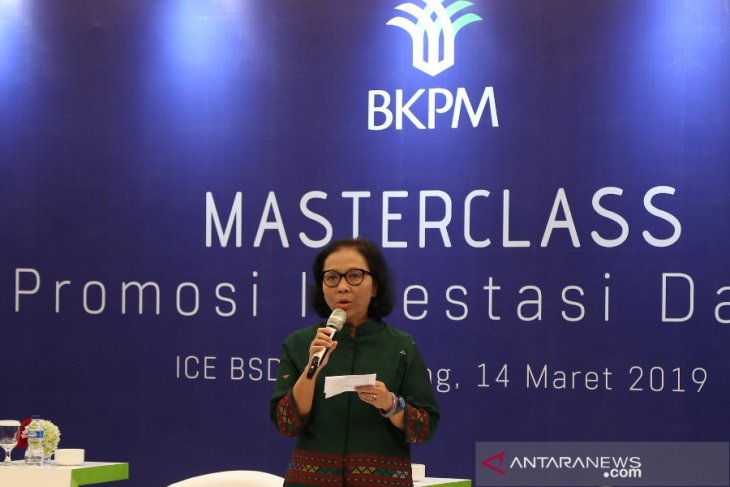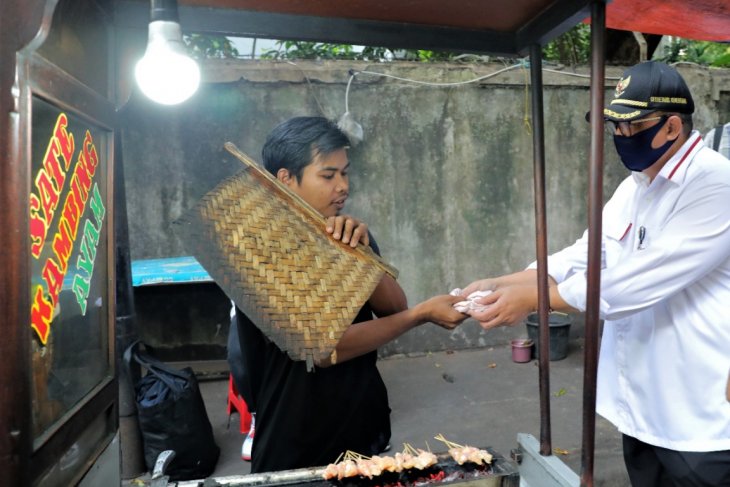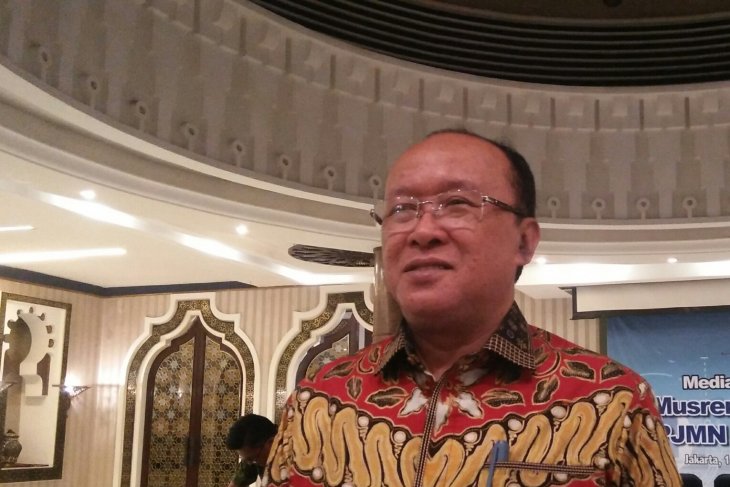Live Streaming
Program Highlight
Company Profile
May
West Java Attracts Highest Foreign Investment among Java's Six Regions
Written by Ani Hasanah Acting Deputy for Investment Control to the BKPM Chief Farah Ratnadewi Indriani.
Acting Deputy for Investment Control to the BKPM Chief Farah Ratnadewi Indriani.
ANTARA/HO-BKPM/Indriani
West Java has drawn the highest foreign investment among six provinces in Java in the past five years, with investment totaling US$22.98 billion, according to the Investment Coordinating Board (BKPM).
Coming second is Jakarta, attracting $17.89 billion of investment; Banten, $10.98 billion; Central Java, $8.82 billion; East Java, $6.04 billion; and Yogyakarta, $0.15 billion.
"Indeed, Java Island, particularly West Java, still holds special attraction for investors. After all, the BKPM will encourage equitable distribution of investment across Indonesia," acting deputy for investment control to the BKPM Chief Farah Indriani noted in a written statement released on Friday.
The BKPM remarked that investment in regions outside Java clocked notable growth in the past five years and inching nearer to that recorded in Java.
Foreign investment in Java Island until the third quarter of 2016 had reached $66.86 billion, while domestic investment amounted to Rp739.70 trillion (equivalent to $53.09 billion).
Over the period of five years, the ratio of investment in Java to that outside it had reached 55 percent to 45 percent of the total investment of Rp3,047.2 trillion.
However, based on data from the Command Center for Investment Operation and Control of BKPM, East Java was ranked first in terms of realized investment in the past five years, totaling $2.18 billion. (ANTARA)
May
Ministry Distributes Free Masks to MSME Makers
Written by Ani Hasanah The Ministry of Cooperatives and Small Medium Enterprises distributes protective masks to micro, small and medium enterprises (MSME) makers. (Ministry Public Relations Office)
The Ministry of Cooperatives and Small Medium Enterprises distributes protective masks to micro, small and medium enterprises (MSME) makers. (Ministry Public Relations Office)
The Ministry of Cooperatives and Small and Medium Enterprises distributed protective masks for free to micro, small, and medium enterprises (MSME) makers as well as the general public to maintain and adhere to health protocols.
The ministry's secretary, Rully Indrawan, noted in a statement received here on Friday that the distribution was conducted since a large number of people and vendors in some areas had yet to follow health protocols and wear masks.
"This is a part of our collective responsibility to ensure adherence to health protocols. These masks have to be worn for our common good," he remarked while distributing masks in South Jakarta's Setia Budi area.
Indrawan further noted that wearing a mask was in accordance with the health protocol that should be followed by MSMEs and the public while outdoors, based on the Large-Scale Social Restriction policy that is still being enacted in DKI Jakarta.
"Wearing a mask is part of the health protocol. A large populace of people have yet to realize the importance of masks. Moreover, sufficient masks are not yet provided for everyone," he stated.
Indrawan is optimistic that the direct distribution of masks to MSMEs and the public as well as awareness on the benefits, functions, and importance of maintaining health would increase.
"The most important aspect is to raise awareness among members of the public that the plague is a joint problem. It must be overcome together with sincerity. Obeying regulations and health protocols as well as staying productive in doing business are paramount," he emphasized.
Indrawan fully supported efforts to facilitate economic recovery for the community while maintaining the health factor and that the masks distributed are products of the MSMEs in Indonesia.
Indrawan spoke of continuing to go around to distribute free masks and personal protective equipment to SMEs, the public, medical workers, clinics, and health services.
Meanwhile, vendors and the public welcomed the effort to distribute free masks by the Ministry of Cooperatives and Small and Medium Enterprises.
"We are grateful. Incidentally, my mask has not been replaced since a long time," Lilis, who sells iftar menu items at the Setia Budi Street, South Jakarta, stated while serving customers ahead of the time to break the fast. (ANTARA)
May
Industry Minister Urges People to Buy Domestic Products
Written by Ani Hasanah
Industry Minister Agus Gumiwang Kartasasmita. (ANTARA/HO-Industry Ministry/sh)
Industry Minister Agus Gumiwang Kartasasmita has urged the public to buy domestic products, in a bid to improve the competitiveness of the Indonesian manufacturing industry, which has been affected by the COVID-19 pandemic.
"Support for the domestic industry will help the sector, including small- and medium-scale enterprises, to survive," Kartasasmita said in a statement here on Friday.
The minister said he believes that domestic industry can compete with imported products, but it would need support from the public to survive and continue production.
The government has launched a national campaign to promote products made in Indonesia, with the hashtag #BanggaBuatanIndonesia (Proud of Indonesian Products), on Thursday (May 14, 2020).
The campaign is expected to encourage people to support national products, Kartasasmita said.
"I hope that the Proud of Indonesian Products National Campaign makes a concrete contribution to the recovery of the Indonesian economy,” he added.
"We should have self-confidence, we can produce the products that we need," he noted.
The Industry Ministry has made a commitment to help SMEs maintain their productivity and encourage them to sell their products through e-commerce platforms, instead of offline points of purchase.
"We see that SMEs have a strong spirit (which would enable them) to face the (current COVID-19) situation,” he added.
In 2017, the ministry had launched an e-Smart IKM program to facilitate SMEs. As many as 11,167 SMEs across the country have participated in the program, which will run until 2024.
"This is the best time for the national industry to move on and sell products through e-commerce platforms," he said.
Kartasasmita cited the example of the coffee processing industry, which was hit hard by the COVID-19 pandemic as many cafes and restaurants closed due to the imposition of large-scale social restrictions in many cities.
To boost coffee sales, the ministry collaborated with a digital platform to facilitate SMEs in the coffee industry through the #SatuDalamKopi campaign in April this year.
The campaign has boosted sales of coffee and coffee products by 57 percent .
The ministry has also encouraged online marketing for Muslim fashion to support producers, and at the same time, strengthen Indonesia's position in the global Muslim fashion industry. (ANTARA)
May
Realization of SDGs Program's Targets Impacted by COVID-19: Bappenas
Written by Ani Hasanah
Deputy for Maritime and Natural Resources at the Bappenas Arifin Rudiyanto.(ANTARA)
The Ministry of National Development Planning (Bappenas) drew attention to the achievement of targets in the sustainable development goals (SDGs) program being affected by the COVID-19 pandemic.
"We have prepared the 2020-2030 SDGs plan. However, in the wake of the COVID-19 pandemic, we need a new draft to change the implementation plan," Deputy for Maritime and Natural Resources at the Bappenas Arifin Rudiyanto noted in an official statement in Jakarta on Friday.
Hence, Rudiyanto stated that Bappenas was preparing a draft of the National Action Plan 2020-2024 as well as short-, medium-, and long-term scenarios to achieve the SDGs goals in the wake of the COVID-19 epidemic.
"COVID-19 is a common enemy, so we are optimistic that the SDGs would be a joint solution. To this end, it is necessary to make SDGs as a framework for growth programs," he noted.
Rudiyanto also highlighted that Bappenas had continued to take precautionary measures in order to mitigate the impact of the COVID-19 pandemic on the realization of several SDGs targets, including the first goal of No Poverty.
Rudiyanto expounded that the achievement of the goal was affected since the COVID-19 pandemic had lowered the income of vulnerable and poor groups and increased the risk of the middle class falling into the category of the poor.
The attainment of the second goal of SDGs of No Hunger too would be affected since food logistics was disrupted owing to the imposition of large-scale social restrictions and decrease in the access to food owing to layoffs.
The third goal of SDGs of Healthy and Prosperous Life will be affected since COVID-19 has impacted the health sector, thereby necessitating improvements and reforms in terms of access, services, and medical devices as precautionary measures against another pandemic.
The fourth goal of the SDGs is Quality Education. The COVID-19 crisis has changed the patterns of learning and teaching at schools, thereby mandating an improvement in the information and communication technology infrastructure to expand internet technology access for poor and vulnerable families and prepare teachers to teach online.
The fifth SDG goal is Gender Equality. This aspect too has witnessed a change in the event of disrupted production health services and increased workload on women in terms of household tasks.
The sixth SDG is to encourage sustained growth in the Economic Sector. However, this will be affected since industries are bearing the brunt of the COVID-19 pandemic. Consequently, Indonesia's growth rate is estimated to plummet to 2.3 percent.
The goal of the seventh SDG is Clean and Affordable Energy. The realization of this goal will encounter challenges owing to the falling prices of fossil energy commodities. Bappenas seeks to ensure that the development of renewable energy is unhindered and still achievable.
The next goal of the SDGs is Reducing Gaps. In the absence of intervention, the poverty rate can reach 10.54 percent in 2020. However, with timely intervention, it can be reduced to 9.24 percent.
However, Arifin believes that in the wake of the COVID-19 pandemic, the government would be able to achieve some targets of the SDGs program owing to improvements in the air and water quality, reduction in carbon emissions and wildlife trade, and increase in biodiversity.
"However, waste processing should be considered, especially medical waste, which contributes to the amount of plastic waste," he pointed out. (ANTARA)


